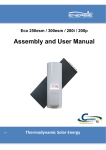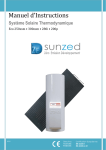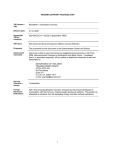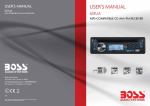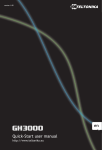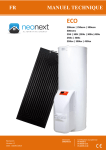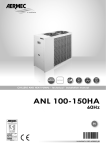Download Assembly and User Manual
Transcript
Eco 250esm / 300esm / 280i / 200p Assembly and User Manual Thermodynamic Solar System R0V0 INDEX 1. 2. 3. 4. 5. 6. 7. 8. Important Operating Procedures Description Technical Specifications 4.1. Thermodynamic Solar Panel 4.2. Hot Water Cylinder 4.3. Thermodynamic Block 4.4. Fluid, R134a 4.5. Safety Group 4.6. Expansion Tank 4.7. Pressure Reducing Valve Installation 5.1. Panel Fixation 5.2. Hot Water Cylinder Installation 5.3. Installation of the Thermodynamic Block 5.4. Connections 5.5. Nitrogen Load 5.6. Vacuum 5.7. Fluid Load 5.8. System Start-up 5.9. System Decommissioning Anomalies / Causes / Solutions Maintenance Procedures ANNEXES Technical Schematics Electrical Schematics 3 3 4 5 5 5 6 6 7 7 7 8 8 9 9 10 12 12 12 13 13 14 15 16 17 21 Eco 250esm / 300esm / 280i / 200p 1. IMPORTANT The Eco shall only be started if the hot water cylinder is fully filed with water. The Eco can only function after the respective refrigerant supply has been connected. The electrical input is: ~230 V, 50 Hz. 2. OPERATING PROCEDURES Please read the following instructions before start installing or operating with the solar system. The Thermodynamic Solar System Eco shall only be used for the heating of fresh water and at the limits indicated on temperature application! Heating of other liquids, such as industrial waters or others, shall not be made with this solar system. The technical rules (DIN 1988) for the supply of fresh water must be taken into account. The thermodynamic solar panel shall be positioned: • Outside; • In a place with good solar capture; • Respect fixing/fastening rules. Positioning of the hot water cylinder must not be done in: • The open air; • In spaces that are potentially explosive due to vapour or liquid gases. Do not turn on the solar system: • With an empty hot water cylinder; • Without fluid supply (R134a). The Eco must always be voltage free when being worked on. - Eco construction and assembly procedures comply with the relevant EC directives. VDE, EN and IEC standards must be complied with when making electrical connections to the Eco. Installation, assembly or maintenance of Eco thermodynamic solar system may only be carried out by qualified personnel! 2.1 PACKING, STORAGE & TRANSPORTATION All Energie – Thermodynamic Solar Systems products are to be kept in the original packaging materials and should be stored or transported in the vertical position - note there is an arrow to indicate the ‘UP’ direction for packing’s. European Certification EN 60335-1 EN 60335-2-21 Directives 73/23/CEE 93/68/CEE Page 3 Eco 250esm / 300esm / 280i / 200p 3. DESCRIPTION The Eco solar system is equipment based on the Carnot principle compression/ refrigeration principle, denominated as a Thermodynamic Solar System. The solar panel is the main component and shall be placed outside for the capture of: • • • • Direct and diffuse Solar Radiation; External air, by natural circulation; The effect of wind (almost always existent); Rain The differences between temperatures, stimulated by the previously described agents, guarantees that Klea (ecological refrigerant fluid) evaporates in the solar panel's interior. The absence of glass in the panel allows for increased thermal exchange by convection. After passing through the panel, the Klea fluid is aspirated by the system’s mechanical component, the compressor, which in turn raises the temperature and pressure; it is then transmitted to the water circuit via a heat exchanger. Before the Klea fluid returns to the solar panel it is necessary for a throttling process occurs, in other words, pressure reduction that guarantees the liquid state is once again achieved, completing the overall cycle. This operational process, in which we ally technology with the laws of nature (changing states of a liquid), demonstrates the power and the potential of the Eco system. LEGEND: 1. 2. 3. 4. 5. 6. 7. 8. Solar Panel Hot Water Cylinder Thermodynamic Block Control Panel Gasket Profile Kit; screws, nuts, washers, wallplugs (6x or 12x) Copper piping Electric cable Fig.2 Overall View of the Equipment Components Page 4 Eco 250esm / 300esm / 280i / 200p 4. TECHNICAL SPECIFICATIONS The thermodynamic solar system Eco is composed by the following components: - Thermodynamic Solar Panel - Hot water cylinder - Thermodynamic Block - Control Panel - Pressure reducing valve - Security group - Brackets, screws, female, washer, bushing (6x) The connections to the panel are Flare SAE (screw) types: - 3/8’’ Aspiration (upper connection) - 1/4’’ Liquid (lower connection) 4.1 Thermodynamic Solar Panel Fig. 4 Panel Connections The thermodynamic solar panel is made of anodized aluminium with corrosion protection. 4.2. Hot water cylinder There are two different types of solar panels: left and right ones (named by the position of the connections). Although they are aluminium made, shall be handle with care. Hot Water Cylinder Height (mm) Diameter (mm) Weight (kg) 250esm 300esm 280i 1500 584 85 1580 680 93 1650 550 40 Tab 2. Hot water cylinder dimensions 4.2.1. Eco 250esm / 300esm / 280i The hot water cylinder is vertical and shall be installed that way. It is made of stainless steel and is thermal insulated with 42 mm polyurethane. Thermodynamic Solar Panel Width Height Thickness Weight Gross Area / Absorver Area Tab 1. Solar panel dimensions 2000 mm 800 mm 20 mm 8 kg 1,6 m² The hot water cylinder is equipped with a cold-water inlet, hot water outlet, recirculation inlet and a magnesium anode. There is a flange type opening in the bottom of the hot water cylinder for placing the thermodynamic block. Page 5 Eco 250esm / 300esm / 280i / 200p The front part of the block has two valves, of 2 and 3 ways destined for the panel connections (3/8'' - Aspiration; 1/4'' - liquid) Expansion valve Flange Fig. 6 Thermodynamic Block (main components) Fig. 5 Hot water cylinder 1 – Enamelled / Stainless Steel 2- Outside coating 3- Hot water outlet 4- Flange 5- Recirculation inlet 6 – Cold water inlet 7- Magnesium anode 4.3 Thermodynamic block We call Thermodynamic Block to the component that transfers the Energy caught by the solar panel in heat transferred to the water. The Thermodynamic Block is connected to the hot water cylinder through eight M10 screws. 4.4 Fluid, R134a R134a is an ecological fluid is not harmful to the ozone layer. It has a high thermal and chemical stability, low toxicity, is nonflammable and is compatible with the majority of materials. PRESSURE/TEMPERATURE GRAPH Thermodynamic Block Height Width Depth Weight Power Input Power Output Fluid , R134a 650 mm 310 mm 300 mm 15 kg 390 - 550 W 1690 -2900 W 550 g It structure is made of galvanized steel that have the compressor, heat exchanger, expansion valve, thermostat, pressure switch, electric resistance. 4.5 Safety Group The safety group enables the system to be protected against situations such as; anomalies in the supply of cold water, the Page 6 Eco 250esm / 300esm / 280i / 200p return path of hot water, emptying of the hot water tank and raised temperatures. It is a valve body made out of chromed brass, in accordance with European ISO 9001 standards. The valve is calibrated to open at 7 bar. NOTE: Installation of the expansion tank is the responsibility of the installer. It can normally be installed into the cold water or hot water piping system. 4.7 Pressure Reducing Valve The pressure reducing valve must always be installed upstream from the safety group and be ready to operate in situations in which the network pressure rises to above 3 bar. This valve comes equipped with a manometer. Fig. 6 Safety Group 1. Threaded orifice (3/4”) for direct connection to the hot water cylinder. 2. Threaded orifice (3/4") for the input of cold water. 3. Security valve discharge orifice, with opening (1”). 4. Feed Valve. 5. Security valve discharge device command. 6. Inspection lid. 4.6 Expansion Tank The expansion tank is a device designed to compensate for any increase in water caused by a rise in temperature. This is the recommended procedure for the correct installation of this equipment. Fig. 8 Pressure reducing valve Characteristics: • • • • • • Chromed Brass Body Max. upstream pressure: 16 bar. Downstream pressure 1 – 6 bar. Max. operating temperature: 65° C Manometer: 0 to 10 bar ¾” Threaded orifice (entry and exit). Fig. 7 Expansion tank installation diagram Page 7 Eco 250esm / 300esm / 280i / 200p 5. INSTALLATION Assembly Sequence • • • • • • • • • Solar Panel(s) Hot Water Cylinder Thermodynamic Block Refrigerating connections (suction, liquid) Hydraulic connections Electrical connections Nitrogen supply Vacuum Installation start-up Fig. 9 Profile fixing diagram 5.1 Panel Fixation It is important to take the characteristics of the installation location and the inclination angle of the panels into account. In order to get maximum benefit from incidental Solar Radiation, the panels must be at an inclination of between 10° - 85° in relation to the horizontal position, preferably orientated towards the South. It may be installed in a wall, façade, roof, plain roof or other. The panel comes already supplied with 6 M8 screws on the lateral tabs. The distance between the holes in the location where the panel is to be fixed must coincide with the panel holes (Fig. 13): Fig. 10 Panel profile fixing process 1. 2. 3. 4. 5. 6. 7. Profile (aluminium) Plastic wall plug Self-tapping screw (M6x40) Washer M6 Screw (M6x20) Nut M6 Panel Page 8 Eco 250esm / 300esm / 280i / 200p Side B Side A Fig. 13 Panel types (left and right) Fig. 11 Panel fixing diagram 5.2 Hot Water Cylinder Installation The system comes with six sets of: profiles, screws, nuts, washers, wall plugs. The panel has 3 small profiles (side A) and 3 large profiles (side B) which shall be fixed according stipulations in the diagram, giving the panel the desired level of inclination. The profile shall be fixed to a base (e.g. a roof) via the provided plastic wall plugs and the self-tapping M6 screws. The M6 screws and the respective nuts and washers shall make the panel fixing to the profiles. The hot water cylinder shall be installed in a cool and dry location with easy access and protected from all weather conditions. The choice of location must allow for easy assembly of the Thermodynamic Block. The spot where the hot water cylinder shall be installed must have nearby: • • • • • A cold water point Hot water point Drainage. Recirculation (if it exists). Electrical point, 230 V/50Hz Observe that in some hot water cylinders the hydraulic connections are at the back of the device, it hence being necessary to consider the spacing between them and the wall. Fig. 12 Panel hole drilling diagram The solar panel shall always be installed with the connections facing downwards. 5.3 Installation of the Thermodynamic Block Refer to the 2 existing different types of panels; right panels (A) and left panels (B). Before installing the Thermodynamic block, make sure that the heat exchanger is not in contact with the resistance casing and the thermostat. To check this, use a multimeter (in the continuity position), positioning a connector on the heat exchanger and the Page 9 Eco 250esm / 300esm / 280i / 200p other on the block’s support structure (compressor or flange) and verify that no continuity actually exists. DHP according to the ISO1337 standards and EN12735). Piping Diameters - The Thermodynamic Block is coupled into the existing flange (at the lower part of the hot water cylinder). - Correctly place the sealing gasket before tightening up between the flanges. GAS (aspiration) mm inches 9,52 3/8’’ LIQUID mm 6,35 inches 1/4’’ Tab 4. Piping diameter (aspiration and liquid) In any circumstance shall be used sanitary water copper tubes. Panel Connections Take off the covers of the copper pipes ends. Place the extremity of the pipe turned down and cut the pipe at a distance intended. Remove the existing barbs. Fig. 14 Coupling of the Block to the hot water cylinder - Place the heat exchanger into the hot water cylinder, taking special care upon its placement, avoiding any damage. - The coupling of the Thermodynamic Block to the water cylinder shall be done with the supplied screws. Tightening of the screws must be done with a crosshead screwdriver, guaranteeing air-tightness. The hot water cylinder shall be properly fixed in place at the moment the Thermodynamic Block is positioned, thus avoiding any slight drop in the unit, considering that there will be a centre of gravity dislocation. Fig. 16 Barbs removal Remove the connections nuts from the panel and place them aside of the pipe. Make a conical shape at the end of the pipes with an appropriate tool. 5.4 Connections The copper tubes used to connect the thermodynamic block to the solar panel shall be refrigerant type without sewage (Type Cu Fig. 17 Conical shape Page 10 Eco 250esm / 300esm / 280i / 200p The conic must not have any barbs or imperfections. The longitude of the walls of the conic one must be uniform. After finished the connection, it must prove that no gas escape exists by applying soap foam on the connections (with nitrogen load on). Fig. 18 Correct conic shape Place the nut with the hand and then rotate it with two keys that shall be applied like torsion pair, as the figure indicates. Fig. 21 Connection Thermal Protection Thermodynamic Block Connection After the installing of the thermodynamic block to the hot water cylinder with the 8 M10 screws, the connections shall be made Fig. 19 Tight the connections An insufficient tightening will cause gas to escape. An extreme squeeze of the coupling will damage the pipe and will cause the gas to escapes. Repeat the procedure used to connect the panel to the copper pipes. Cut of the pipe in the required length with the extremity directed towards down. Clean the existing barbs. Before making the conic shape in the pipe, do not forget to place the nut in the pipe. Fig. 20 Tightening with proper keys Pipe diameter mm (inches) 6,35 (1/4’’) 9,52 (3/8’’) Tab.5 Tightening Torsion Nm 14 -18 33 - 42 The entrance of piping into the building shall be finished to guarantee total resistance against rain and moisture. Page 11 Eco 250esm / 300esm / 280i / 200p The piping must be properly insulated with a flexible insulation sleeve made from (Armaflex type) elastomeric foam in order to prevent any possible condensation brought about by low temperatures in the liquid. 5.5 Nitrogen Load After connections been concluded guarantee that there is no leakage. The nitrogen load must be done through the 3 ways valve until the pressure reaches 12 bar. Place all the connections under soap foam and verify if the pressure is kept constant. Fig. 23 2 and 3 ways valves details 5.6 Vacuum 1- 3 way valve 2- Pressure Inlet 3- Valve Bush 4- Valve rotor 5- Hexagonal Key 6- 2 way valve 7- Conical Nut 8- Liquide Line (smallest diameter) 9- Gas line (bigest diameter) Fig. 26 Nitrogen pipes and panel load Use only the vacuum pump to remove the air and the humidity from the pipes. Fig. 24 Connecting the pipes to the thermodynamic block Press the nut with the hand by giving some turns, and apply the pair of keys like seen before. Never use the gas to extract the air or the humidity from the pipes. That will reduce the life of the compressor drastically. All the valves shall be turned off before the vacuum is start being made. This way the vacuum will only be done inside the tubes. 5.7 Fluid Load After carried through the vacuum process the two valves shall be open for the fluid circulate all in the system. To enhance that the system is supplied with a pre-load that is enough for a maximum length of 10 meters Fig. 25 Tightening the tubes to the valves Page 12 Eco 250esm / 300esm / 280i / 200p between the solar panel and the thermodynamic block. For situations that this length is exceed is necessary to have to make adjustments of the load. These adjustments shall be done by the compression pipe with the system stopped. The Eco is equipped with an electrical resistance heating process in case of any eventual system breakdown. If it is necessary to use this function, press the Electrical Support (3) ON/OFF button on the command panel and the water will be heated via electrical resistance. 5.8 System Start-up 5.9 System Decommissioning The Eco commissioning is assured by the correct installation achieved and by the respect of all installation instructions. Increasing water temperature from 10° C to 55° C will vary between 4 to 8 hours, depending on weather conditions and type of installation. It is always possible to do a tune of thermal expansion valve to adapt the system to a suitable outside weather conditions by the temperatures extrapolation method. At the end of the product lifetime, decommissioning of the system should be undertaken by an installer or suitable qualified plumber and / or electrician (if required). All materials used in this product can be passed to your local material recycling centre for disposal - refer to local council regulations for details. Fill the hot water cylinder with water and purge the existing air, opening a hot water tap/faucet. Check if the valves are properly working and if the system is filled with fluid. There aren’t any failure problem when starting the system under frost conditions. To conclude the installation process it is necessary to connect the electrical cable to the 230V plug socket, securing the control panel with two M6 screws. To turn the apparatus on, press the general ON/OFF button (1) on the control panel. Afterwards, press the ON/OFF button on the Solar System (2). The display must give information that the system is operational (ON). Heating up of the water will now begin. Page 13 Eco 250esm / 300esm / 280i / 200p 6 CONTROL PANEL You may start up the Eco if all instructions have been accomplished. The rise up of the water temperature from 10ºC to 55ºC may vary between 2 and 10 hours depending on the model of the solar system and the outside conditions. The command panel is an interface between the user and the equipment and you may have information about the working of the solar system. Fig. 23 Control Panel Nº Button Display Name Function 1 ON/OFF Button Allows the user to switch power ON or power OFF. If you press this button the display present the following information: 2 ON/OFF Button for the Solar System Works for turning the power ON/OFF only for the compressor. It has a one-minute delay before turning the system OFF, between that time the word ON will blink on the screen. 3 ON/OFF Button for Electrical Backup This shall only be turned on an emergency situation to ensure hot water to the user in case of a system malfunctioning. 4 5 This allows the modification working parameters. Programming Button Do not use this unless you are a trained technician (Factory Only) otherwise you could damage the solar system that will result in guarantee lost. Anti-Legionella Button Activate the anti-legionella program. This will rise up the temperature of the water until 65ºC. Only turn ON this program if you do not predict to have any water consuption on the next 8 hours. Legend a- Temperature b- Output ON c- State of the System (OFF, ON, ALM) d- Errors e- Factory Parameters Page 14 Eco 250esm / 300esm / 280i / 200p 7 ANOMALIES / CAUSES / SOLUTIONS ANOMALY CAUSE SOLUTION Verify the presence of 230 V A/C at system input source. System turned off Check that the system is turned on. The water is cold and the compressor does not function. (Display shows no information) Make sure electrical cabling is not disconnected. The water is cold and the compressor does not function. Protection system activated Check electrical protection (the Fuse). (Display shows no information) Condenser is covered with lime Check for Low Pressure breakdown (“LP” Error). Carry out effective cleaning. Cold or lukewarm water, but compressor is functioning. Excessive water consumption Wait for Thermal Charging to occur. Alteration in electronic parameters Substitute the electronic panel. Refrigerant fluid leakage Badly connected voltage input Refrigerant fluid leakage Condenser is covered with lime Detect and repair the leak. Check voltage feed (230 V). Detect and repair the leak. Carry out effective cleaning. Check if there is power supply. Check the electrical cables connection for the control panel. Check the system fuses. The compressor periodically stops and starts Lack of power The display do not present any information Safety thermostat ON LP Error on display: Fluid missing in the solar panel circuit Rearm the safety thermostat Turn ON the electrical backup if needed. Outside temperatures too low Every time that a LP error occurs the system will have a 20 minutes delay, during that period the word “ON” shall blink in the screen. Solar system is shut down Press the ON/OFF button for the solar system Power supply malfunction Check the fuses. Excess of water usage Wait for the water to warm up The display presents the word: The display presents the following information but the water is cold: Page 15 Eco 250esm / 300esm / 280i / 200p Technical Support Notes: - Melted Compressor fuse; start-up condenser capacity must be checked. - Melted RES fuse; the possibility of a short-circuit must be verified (e.g. electrical resistance). - Safety thermostat operational; electronic panel parameters must be checked. 8. MAINTENANCE PROCEDURES Magnesium Anode The anode must be removed in order to check it state. If the magnesium anode is letting water pass it will be necessary change it. The period between changing the anode is always dependent of the water quality in each location. In areas with raised concentrations of soluble solids, the anode needs to be changed with less regularity, whereas in situations with low concentration, the anode needs to be changed with greater regularity. Therefore the magnesium anode state shall be checked at least one time per year. Pressure Reduction Valve Filter The following procedure shall be done for periodic (maximum once every two years) cleaning of the pressure reduction valve filter: 1. 2. 3. 4. Close the passage of water from the network. Turn in an anti-clockwise direction after relieving the spring’s tension. Draw back the lever/handle. Remove the filter and clean it. Page 16 Eco 250esm / 300esm / 280i / 200p 9 TECHNICAL DATA System Eco 280i / 200p Eco 250esm / 300esm UNITS Potential Data Thermal Power 1690 – 2900 W Absorbed Power 390 – 550 W 1200 W Electric Support Power Compressor Hermetic / Piston Type Noise Level 39 Thermodynamic Solar Panel dB Material High Performance Anodised Aluminium Quantity 1 2000 x 800 x 20 mm 12 /1,2 15 / 1,5 bar / Mpa bar / Mpa Min. Temperature 120 -5 ºC Min, Exposure Temperature - 40 ºC Dimensions Max. operating pressure Test pressure Max. Temperature ºC Hot Water Cylinder Material Stainless Steel Enamelled Polyurethane Insulation 6 / 0,6 Max. working pressure Test pressure 10 / 1,0 90 Max. Operating Temperature bar / Mpa bar / Mpa ºC Magnesium Anode Protection Fluid Type R134a Quantity 1100 kg Copper 1/4” inch 3/8” inch 230 / 50 V/Hz Compressor Fuse 6.3 T A General Fuse 6.3 F A Connections (piping) Type Liquid Line Aspiration Line Electronic Panel Feed Page 17 Eco 250esm / 300esm / 280i / 200p 10 DIMENSIONS AND TECHNICAL SCHEMATICS Eco 250esm 4 4 3 2 H A G B C F 1 D E 1- Cold water inlet 2- Recirculation 3- Hot water outlet 4- Magnesium anode A B C D E F G H 1 mm 70 1050 1450 584 2 3 4 3/4'' 5/4'' inches 820 350 800 1500 3/4'' 3/4’’ Page 18 Eco 250esm / 300esm / 280i / 200p Eco 280i 3 3 2 2 B C H 4 1 A 1 D E 1- Cold water inlet 2- Recirculation 3- Hot water outlet 4- Magnesium anode A B C D E H 1 mm 260 750 1280 550 2 3 4 3/4'’ 1’ 1/4’’ inches 800 1650 3/4'’ 1/2'’ Page 19 Eco 250esm / 300esm / 280i / 200p Eco 300esm 3 3 4 4 2 A G B H F 1 D E 1- Cold water inlet 2- Recirculation 3- Hot water outlet 4- Magnesium anode A B D E F G H 1 2 mm 90 770 680 930 3 4 1’’ 5/4’’ inches 350 850 1580 1’’ 1’’ Page 20 Eco 250esm / 300esm / 280i / 200p Eco 200p (Wall Hanging) 2 2 3 4 B I C F H E 4 A G 1 J D 4 3 1 1- Cold water inlet 2-Magnesium anode 3- Hot water outlet 4- Fixation 2 A B C D E F G H I J 1 mm 180 750 900 800 370 2 3 4 inches 920 280 1250 1030 235 3/4’’ 1’’1/4 3/4’’ Page 21 Fixation Eco 250esm / 300esm / 280i / 200p Electrical Schematic Eco 250esm / 300esm / 280i / 280p LP Sonda 1 a Fuse 2 10 11 12 13 14 15 Electrónico Electronic Fuse 1 1 2 3 4 5 6 7 8 9 b T C F N T –Legenda Safety Thermostat (75ºC) T - Termóstato de segurança (75ºC) C – Compressor C- Compressor R – Resistance R- Resistência LP – Low Pressure Switch LP- Pressostato de Baixa Sonda1 – Temperature probe Sonda1- Sonda de temperatura a,b – Extra contacts a, b- Contactos extra Fuse 1 – General fuse Fuse 1- Fusível Geral Fuse2 – Compressor fuse Fuse 2- Fusível Compressor C T R L/N/T 230VAC 50Hz Page 22 Eco 250esm / 300esm / 280i / 200p Guarantee This guarantee covers all defects to the confirmed materials, excluding the payment of any type of personal damage indemnity caused directly or indirectly by the materials. The periods indicated below start from the purchase date of the apparatus, 6 months at the latest from the leaving date from our storage warehouses. Hot Water Cylinder 3 Years: Stainless Steel 2 Years: Enamelled Manufacturer Guaranteed Solar Panel Thermodynamic Block 5 Years Against Corrosion 2 Years Guarantee Exclusions The guarantee ceases to be effective when the apparatus is no longer connected, used or assembled in accordance with manufacturer instructions, or if there has been any form of intervention by unauthorised technicians, has the appearance of modifications and/or if the series number appears to have been removed or erased. Further exclusions from guarantee: • Hot water cylinders have been operating in water with the following indexes: o Active chlorine > 0.2 ppm o PH < 6 (Sorensen scale at 25° C). o All water has a value greater than the VMA, by decree – law 74/90 • Parts • Breakdown due to incorrect handling, electrical discharges, flooding, moisture or by improper use of the apparatus. • The • The guarantee lapses if this certificate is incorrectly filled in, if it is violated or if it is returned after more than 15 days have passed since the purchase date of the apparatus. are subject guarantee to lapses natural if it wear is and tear transferred – to levers, another switches, owner, resistances, even if programmers, within the thermostats, guarantee etc. period. ATTENTION: Technical assistance costs, even within the guarantee period, shall be supported by the customer (Km and assistance time). In cases where there is no justifiable breakdown and subsequent need for technical assistance, the client will pay for lost technical assistance time. NOTE: This sheet should remain with the manual, for the customer. The following sheet shall be completed and must be returned to Energie est, Lda. otherwise the guarantee will not be valid. Date : _____/_____/__________ Installer Stamp and Signature : Page 23























